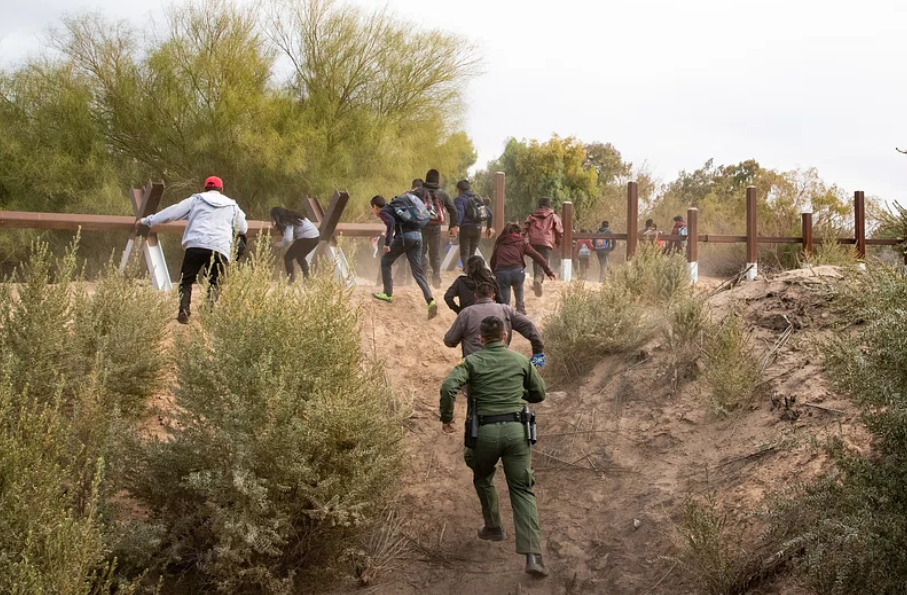There is a major confrontation brewing right now on the southern border between Texas and the federal government. This confrontation is both predictable and avoidable, and one that raises the question: What’s a state to do?
Practically speaking, what is a state to do when its own well-being is threatened and D.C. won’t assist?
Think back over your lifetime and try to remember any disaster declaration by any state governor that did not result in federal government aid. Every tornado, hurricane, winter storm, flood, or earthquake, when declared a disaster by the governor of any state, regardless of political affiliation, always sees the federal government respond with all available resources to alleviate human suffering and ensure stability. Federal funds are always applied immediately to help displaced civilians find aid and comfort.
Yet Texas Gov. Greg Abbott did just that with the border crisis and was rebuffed.
What we are witnessing on the southern border is one of the worst disasters to ever strike any state. The sheer magnitude of the human wave flooding our border communities is devastating ranches and farms, overwhelming municipal services, stretching law enforcement, wreaking havoc on local economies, overwhelming medical facilities, and injuring and killing innocent people. It is a disaster on a scale not seen during our lifetimes.
Compare the present cost in blood and treasure to the worst events on record:
Hurricane Katrina caused the deaths of 1,390 people and over $125 billion in property damage
The 9/11 attacks caused the deaths of 2,977 people
In 2004, the Indian Ocean earthquake and tsunami caused the deaths of over 225,000 people
In 2010, a major earthquake hit the island nation of Haiti, killing hundreds of thousands and leaving the country in ruins
In each case, foreign or domestic, the U.S. government rushed to the disaster sites with aid, assistance, and even military intervention. Congress established tax credits and special loan programs.
But not for Texas. Not on our southern border. Under the Biden administration, a state can be sued if it merely tries to stanch the bleeding of illegal mass migration.
“The El Paso Times” recently reported that 149 migrants died in the El Paso sector of the border during the previous fiscal year. Residents in southern New Mexico are said to be regularly “stumbling on the bodies in the desert.” The International Order for Migration recently named the U.S.-Mexico border as the “world’s deadliest migration land route.” “The Wall Street Journal” reported last March that local officials in Eagle Pass, Texas, must keep a refrigeration truck available for the bodies of migrants who drown in the Rio Grande. In September, the migrant death toll hit 500 – people lured here by Biden’s policies.
Those are just the illegal migrant tolls. The physical and economic damage wrought on the U.S. is no less devastating.
In 2023, the Federation for American Immigration Reform posted a study indicating the overall cost of illegal immigration to U.S. taxpayers was over $150 billion! The Heritage Foundation reports that the Border Patrol encountered thousands of illegals in 2023 with prior violent criminal records, further noting that “[a] 2021 Department of Justice report revealed that 64% of federal arrests in 2018 involved noncitizens, despite them comprising only 7% of the population.” In 2022 alone, over 73,000 people in the U.S. died from fentanyl overdoses – a drug largely trafficked over our southern border – more than double the combined deaths from the three preceding years.
Again, what’s a state to do?
In the absence of meaningful federal assistance, Texas has taken extraordinary steps to secure border regions with wire, walls, and water barriers. The federal government removed them, cut them down, and sued Texas for doing so.
Every governor swears an oath to support and defend the Constitution of the United States and of the state in which he or she serves. It is an oath, a sacred duty.
Considering that oath, Texas hit the proverbial limit this past week and invoked the 10th Amendment in a big way, with Abbott declaring that his National Guard would no longer allow the U.S. Customs and Border Patrol (CBP) to work in part of Eagle Pass, Texas. The CBS affiliate in Austin reported that the Department of Homeland Security threatened to take “legal action” and examine “all other options” … whatever that means.
Over a decade ago, the Alabama Legislature passed landmark legislation designed to enforce federal immigration law at the state level. We were harangued, threatened, protested, and doxxed. We were also sued and watched as whole sections of the law were diced up by liberal judges. As state leaders, we were ahead of our time and took some solace in knowing that we had done what we could. Seeing the current plight of Texas, I find myself wishing we were back to the lesser levels of devastation and disruption we saw during those Obama years.
So, the question remains: What’s a state to do?
Does the 10th Amendment afford a state the right to defend its own borders? Arguably, yes. We are watching a confrontation unfold between Texas and the federal government that may become one of the most dramatic legal challenges ever brought over the application of a state’s right to support and defend its own interests in the wake of a disaster – a disaster for which the federal government refuses to help, and even causes to happen.
But Texas is not alone. Other states see their plight and are responding with aid.
Texas is back in the Alamo doing what Texans do.
God bless Texas.
To contact Phil or request him for a speaking engagement, go to www.rightsideradio.org. The views and opinions expressed here are those of the author and do not necessarily reflect the policy or position of 1819 News. To comment, please send an email with your name and contact information to Commentary@1819News.com.
Don't miss out! Subscribe to our newsletter and get our top stories every weekday morning.










